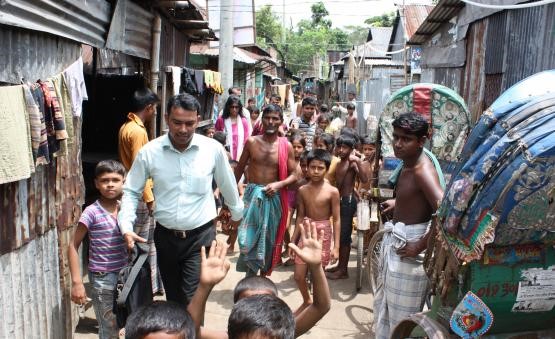

After an hour and a half on Dhaka’s crowded roads where the kamikaze bus driver is king, I reach Chanpara slum in Roopgong, just outside of the Bangladeshi capital.
The corrugated iron huts are home to 40,000 people – a small slum by Bangladeshi standards – but the problems faced by the residents of Chanpara slum are huge. With shared toilets and bathing areas, and no street lighting, the dark alleys of this slum hold many dangers for the women and girls of the slum.
Displaced during the war of independence in 1971 and forced to move to this land, the people of Roopgong have found themselves in a black hole. With no government money coming into the area, they’re left to fend for themselves, cut off from all public services and surrounded by pools of polluted water.

Health and hygiene in Roopgong is a real problem. People living in the slum are forced to buy drinking water but rely on the river for all their other water needs. With factories upstream releasing their waste into its waters and community toilets overflowing into the river, the people of Roopgong are forced to wash themselves and their clothes in the highly polluted water – and have skin infections and insect bites to show for it.
But the threats posed by the heavily polluted water are not the only ones faced by the women and girls of Roopgong. A lack of local infrastructure means that they’re forced to share the toilet and bathing areas with the men of the community, and this puts their security at risk. As one member of a reflect circle – a discussion group set up by ActionAid’s local partner, which gives the young women and girls a safe place to come and discuss their problems, and find solutions together – explained to me:
The boys are always there. They stand and watch and tease us whilst we bathe
At first thought, you may think it sounds quite innocent. After all, Bangladesh is a densely populated country and home to over 160 million people – and they do say that in Bangladesh, there’s always someone watching. But the teasing and name calling – already unpleasant for the vulnerable young women – often leads to sustained sexual harassment and violence.

All of the 30 or so women in the group told me that they had suffered violence at some point in their lives. To try and protect their daughters, they have stopped them from going out at night, as the dark alleys of the slum provide cover for violence and sexual assault. But in doing so they’ve been forced to deny their daughters the same freedom that is enjoyed by the men and boys around them.
When I asked the women what needs to happen to reduce this threat of violence? Their response was quite clear – they need to make their cities safer.
Street lighting would make the slum safer, and if the roads were clean and paved, it would be much easier for them to move around.
Having a bathroom in their homes would mean that they wouldn’t have to go out at night to use the toilet and put themselves at risk of harassment or sexual assault – something that we may take for granted but which would have huge impacts for the women of Roopgong.
By getting together, the women have given themselves a much stronger voice. They meet four times a week for an hour each time to discuss their problems and try to find solutions together.
So far, they’ve managed to stop child marriage in their community – a huge achievement. Now they’re trying to make the local government take notice of their situation and help them to reduce violence by improving the facilities for women and girls in Roopgong.
